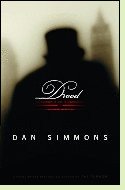|
Droodby Dan SimmonsReviewed by Margaret Donsbach
In Drood, Dan Simmons uses Dickens's friend Wilkie Collins to tell the story of Dickens's last years, beginning with the terrifying 1865 wreck of a train in which Dickens was traveling, and ending with Dickens's death on the fifth anniversary of the train wreck. Collins, too, wrote novels: The Woman in White and The Moonstone rivaled some of Dickens's works in popularity. He was a heavy user of opium in the form of laudanum, which gives Simmons the opening to create a phantasmagorical horror story around the creation of Dickens's last novel. Most interesting are the first chapter, in which Dickens tells Collins the story of the train wreck and introduces a vampire-like character who walks among the injured and dying passengers, and the last three chapters, which resolve the mystery of Drood and give Collins a moment of uncharacteristic clarity and insight. This novel might have been a taut, clever thriller at 350 pages. At over 750, the repetitive detail, especially of Collins's opium fantasies, can become tedious. Both characters are portrayed as self-absorbed, self-promoting men who care little about the feelings and needs of others, though as the novel progresses and the Collins character behaves more despicably, the Dickens character, the target of Collins's increasingly insane jealousy, becomes somewhat rehabilitated. Simmons's exhaustive research shows in every page, transporting the reader to late nineteenth century London with its squalor that spills over to taint even the lives of the well-to-do. For this reader, the realistic aspects of the story were far more compelling than the occult. Simmons's previous novels are all contemporary thrillers, but he is exceptionally skilled at bringing the past to life. It would be interesting to see what he could do with a straightforward historical novel. (2009, 775 pages) More about Drood at Powell's Books
Girl in a Blue Dress by Gaynor Arnold (2008), about the widow of a writer based on Charles Dickens and her memories of their troubled marriage. More info Wanting by Richard Flanagan (2009), about Charles Dickens and his efforts to assist the widow of Arctic explorer Sir John Franklin in clearing his name from accusations of cannibalism. More info Mr. Dick; Or, The Tenth Book by Jean-Pierre Ohl (2008), about a modern French journalist who discovers a memoir describing the final days of English novelist Charles Dickens. More info The Last Dickens by Matthew Pearl (2009), a thriller about the efforts of Charles Dickens's American publisher to find and publish the end of his unfinished last novel, despite murderous opposition. More info
The Mystery of Edwin Drood More info at Powell's Books or Free online version at Dickens-Online
1935 film The Mystery of Edwin Drood starring Claude Rains. More info 1993 film The Mystery of Edwin Drood starring Robert Powell. More info 1997 film of Wilkie Collins's The Moonstone starring Greg Wise. More info
Dickens: Public Life and Private Passions by Peter Ackroyd (2002). Charles Dickens (Penguin Lives) by Jane Smiley (2002). More info The Secret Life of Wilkie Collins by William Clarke (1988). More info Wilkie Collins (Oxford Authors in Context series) by Lyn Pykett (1998).
Short biography of Wilkie Collins at www.Wilkie-Collins.info Charles Dickens at the BBC History website
Back to Historical Novels: 19th Century Europe
|
 Charles Dickens's novel The Mystery of Edwin Drood was incomplete when he died, bequeathing today's novelists with the delectable mystery of what Dickens might have written in the second half of the novel and why.
Charles Dickens's novel The Mystery of Edwin Drood was incomplete when he died, bequeathing today's novelists with the delectable mystery of what Dickens might have written in the second half of the novel and why.